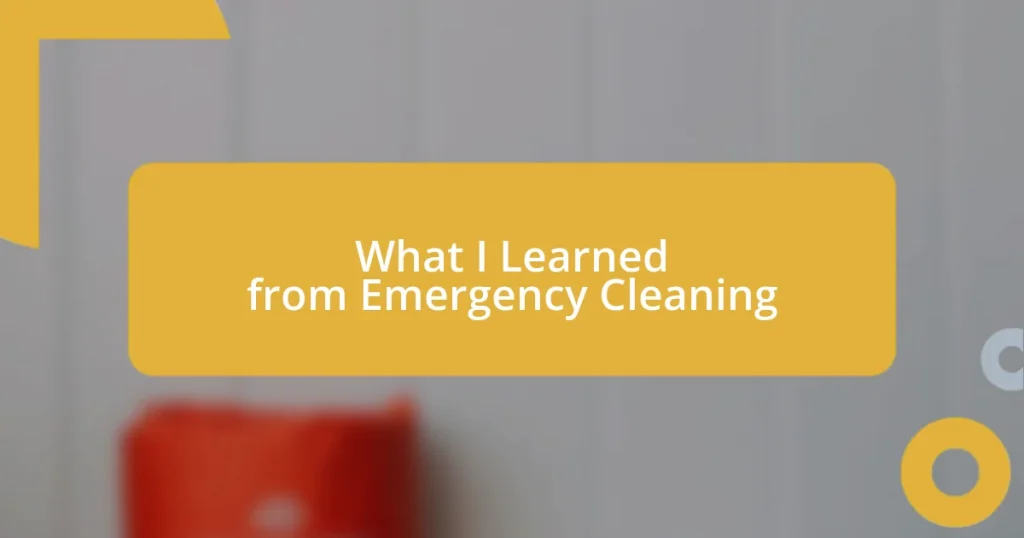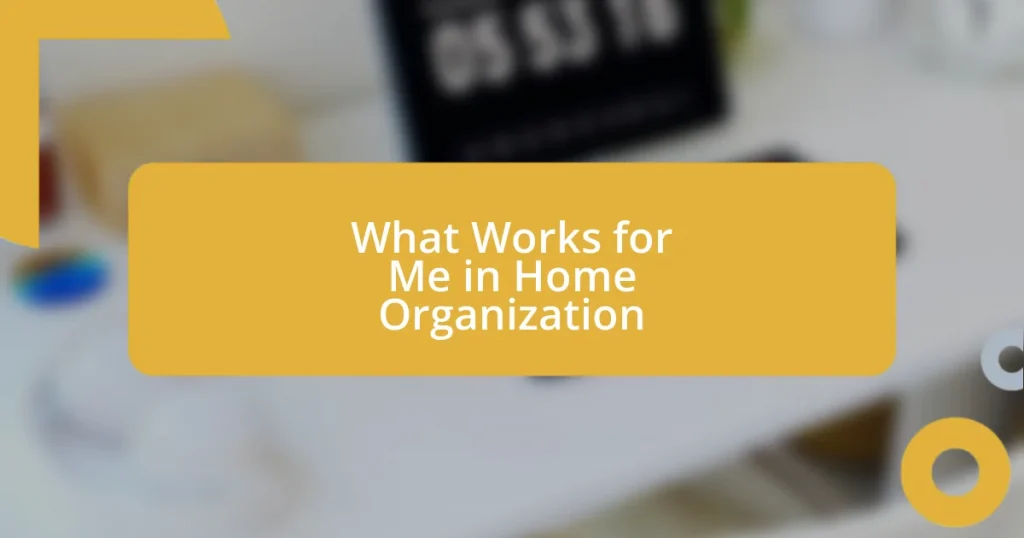Key takeaways:
- Being proactive with emergency cleaning involves having a plan, a supply kit, and a list of trusted cleaning services ready to minimize stress during crises.
- Effective rapid cleaning techniques include prioritizing tasks, using a top-to-bottom approach, and setting time constraints to boost productivity.
- Emotional resilience and maintaining a positive perspective can transform challenging cleanup situations into manageable tasks, fostering a sense of accomplishment.
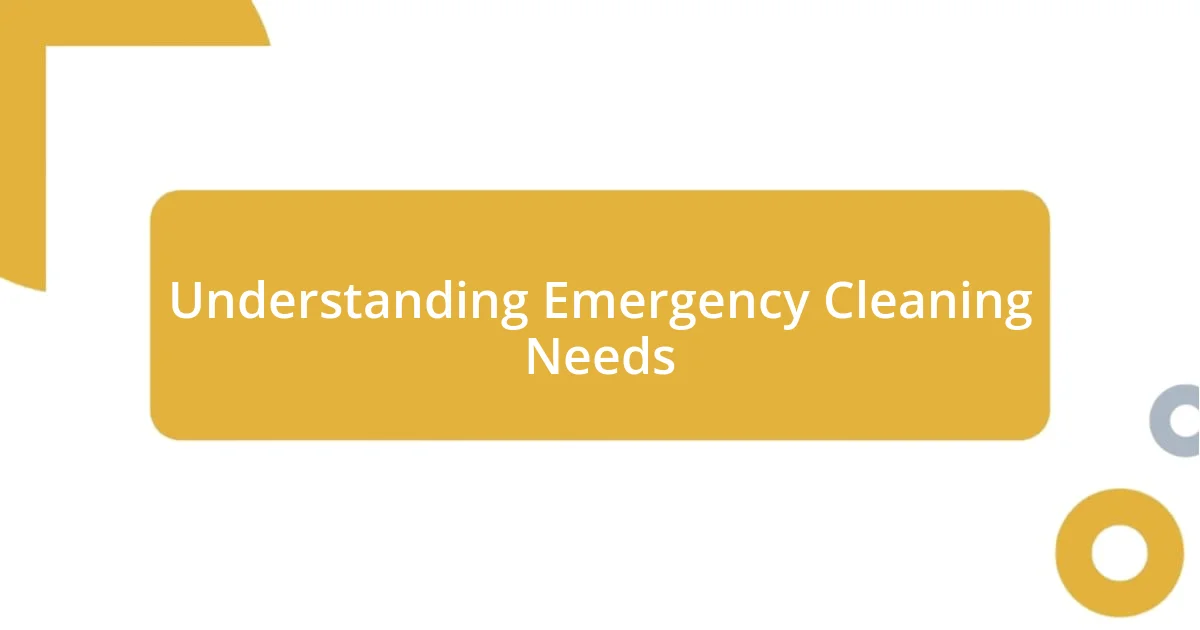
Understanding Emergency Cleaning Needs
Emergency cleaning needs can arise at any moment, often triggered by unexpected events like water damage or biohazard incidents. I remember the panic I felt when a pipe burst in my home, transforming my living room into a mini swimming pool. In that moment, it was clear that the stakes were high; addressing the mess quickly was essential to prevent further damage and stress.
When I think about emergency cleaning, I can’t help but wonder how prepared we are for such situations. The reality is that many of us don’t have a plan until disaster strikes. Personally, I learned that having a list of trusted cleaning services and a few basic supplies on hand can make a significant difference. It’s about being proactive rather than reactive.
Moreover, I’ve come to appreciate the emotional toll that emergencies can take on those affected. In my experience, the relief of having a professional cleaning service handle the chaos not only cleared my space but also eased my mind. In these moments, understanding the urgency and sensitivity of the situation can truly transform the experience for everyone involved. How often do we pause to consider the emotional weight behind a cleaning emergency?
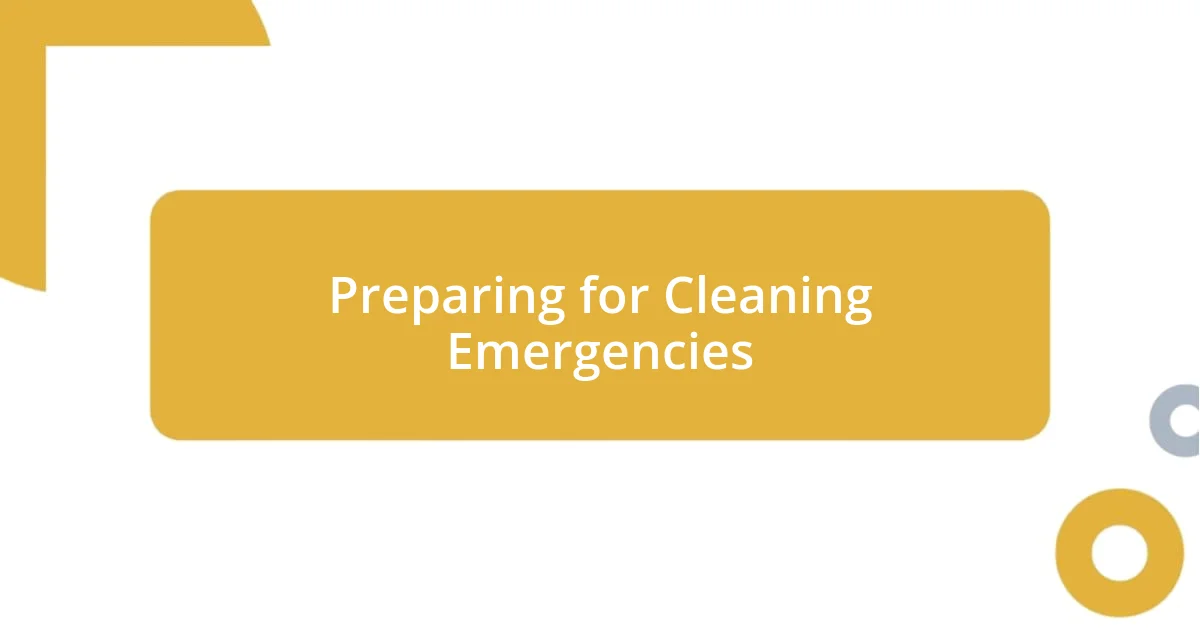
Preparing for Cleaning Emergencies
Preparing for cleaning emergencies may seem like a daunting task, but I’ve realized it’s all about having a plan. I distinctly remember a friend of mine who didn’t prepare for a flooded basement and ended up scrambling for help. If only she had a checklist of necessary supplies—like towels, buckets, and protective gear handy—it could have significantly streamlined her response.
I believe that a solid emergency plan includes not only having supplies but also knowing who to call when things go south. After my own experience with a broken refrigerator leaking all over my kitchen, I committed to researching local cleaning companies beforehand. This foresight saved me precious time during a crisis. Wouldn’t it be great to feel that sense of security when an unexpected mess kicks in?
Having designated areas for your emergency supplies is another valuable lesson I learned. I once wasted precious time rummaging through closets in a panic instead of springing into action. Now, I have a clearly marked box in my garage filled with essentials, ensuring I can handle a crisis without the unnecessary stress of searching. What strategies have you implemented to mitigate chaos during unexpected cleaning emergencies?
| Preparation Strategy | Benefits |
|---|---|
| Emergency Supply Kit | Ensures quick access to necessary items during a crisis. |
| List of Trusted Cleaning Services | Reduces stress by knowing whom to call when professional help is needed. |
| Designated Storage Area | Saves time and energy when every second counts. |
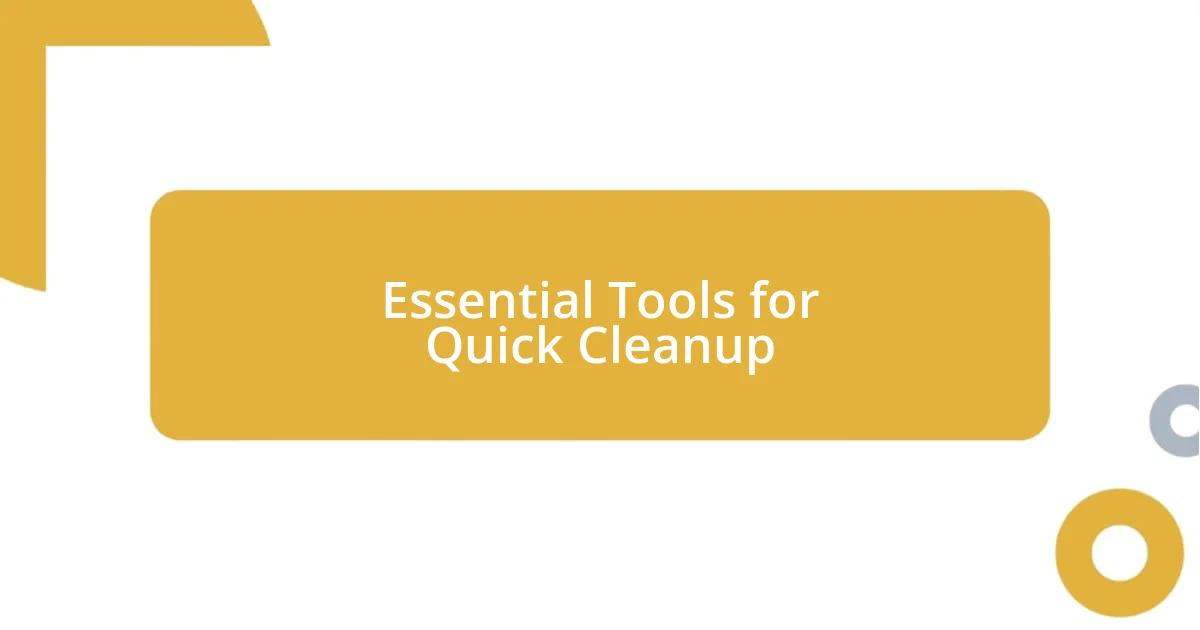
Essential Tools for Quick Cleanup
When it comes to quick cleanups, having the right tools on hand makes all the difference. I vividly recall a neighbor’s chaotic situation when her pet had an accident during a dinner party. If she had been equipped with a solid arsenal of cleaning essentials, that embarrassing moment could have been a lot less stressful for everyone involved. From my perspective, a handful of trusted tools can transform an emergency cleanup experience from overwhelming to manageable.
Here’s a quick list of essentials you should consider having readily available:
– Microfiber Cloths: Super absorbent and great for spills.
– Heavy-Duty Trash Bags: Ensure you can dispose of waste efficiently.
– Broom and Dustpan: Perfect for sweeping up debris quickly.
– Wet/Dry Vacuum: A lifesaver for liquid messes, especially in water damage scenarios.
– Cleaning Spray: Multipurpose cleaners can tackle various surfaces with ease.
– Rubber Gloves: Protects your hands from bacteria and harsh chemicals.
– Paper Towels: For fast absorption and easy disposal.
Having these tools at your fingertips can help you maintain your composure in seemingly uncontrollable moments. I can’t emphasize enough how handy my portable cleaning kit became during a recent barbecue when an unexpected rainstorm hit, leaving muddy footprints everywhere. That swift cleanup followed by a sense of accomplishment turned a potential disaster into a memorable evening!
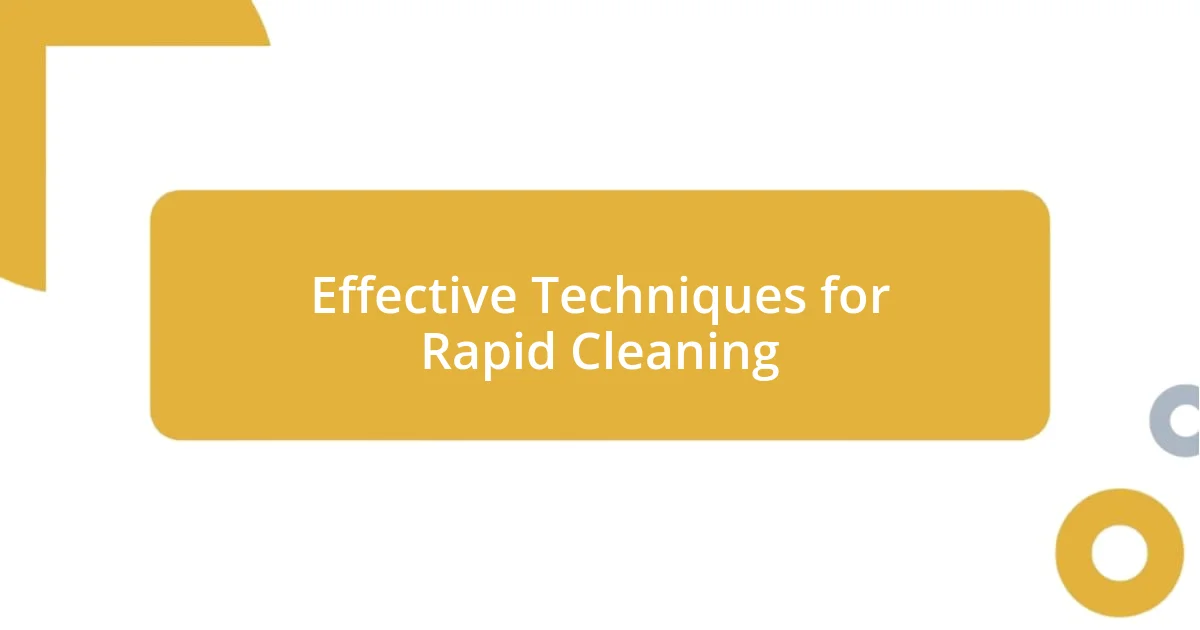
Effective Techniques for Rapid Cleaning
In my experience, one of the most effective techniques for rapid cleaning is prioritizing tasks. I remember a time when my toddler knocked over a glass of juice all over the living room carpet. Rather than getting overwhelmed, I quickly focused on soaking up the excess liquid with towels first; addressing the biggest mess right away made all subsequent steps feel more manageable. Have you ever noticed how tackling the most daunting mess first can instantly calm the chaos?
Another technique I swear by is the “top to bottom” approach. Once, after a last-minute dinner party, I found myself surrounded by dishes, crumbs, and spills everywhere. I started at the countertop and worked my way down to the floor, ensuring that I wasn’t just redistributing the mess. It was surprisingly therapeutic to see each section become spotless before my eyes. How satisfying is it to watch your space transform, even in a pinch?
Lastly, a timer can be a game changer during frantic cleaning sessions. I once set my phone for just 10 minutes while prepping for unexpected guests. It motivated me to zoom through clearing surfaces and wiping down furniture efficiently. The pressure transformed my cleaning pace, and I was so pleased with how much I accomplished in such a short time. Isn’t it amazing what a little time constraint can do to boost our productivity?
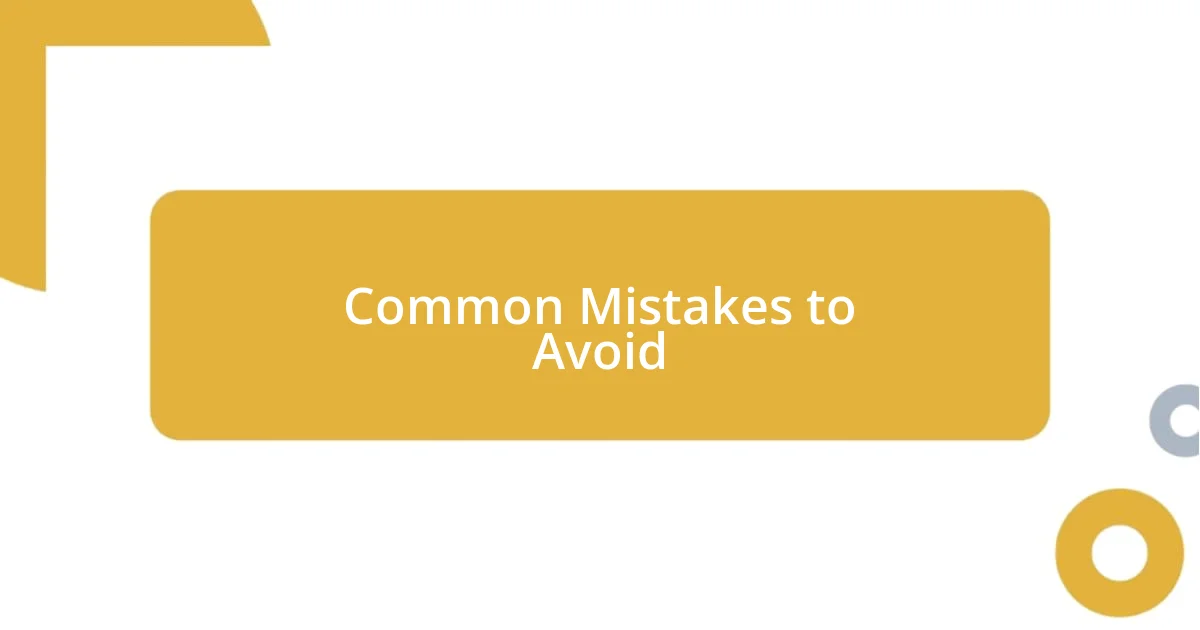
Common Mistakes to Avoid
One common mistake I’ve often made is underestimating the time needed for an emergency cleanup. I remember racing against the clock to prepare for surprise visitors once and thinking I could complete everything within 15 minutes. Spoiler alert: I didn’t. When you’re panicking, it’s easy to think you can do it all quickly, but it’s crucial to allocate sufficient time to avoid last-minute stress.
Another pitfall is neglecting to assess the mess thoroughly before diving into cleanup. I once jumped straight into scrubbing a stubborn stain on my couch before realizing I hadn’t checked the fabric type. That oversight led to a mishap where my scrubbing caused more damage. Taking a moment to evaluate the situation can save you from unintentional blunders and further headaches.
Finally, I’ve learned not to shy away from asking for help. In one frantic moment during a family gathering, I tried to tackle everything solo. It took me twice as long and left me feeling overwhelmed. I soon discovered that delegating tasks to family members or friends can lighten the load and make cleanup a more enjoyable shared experience. Isn’t it always better to tackle challenges as a team?
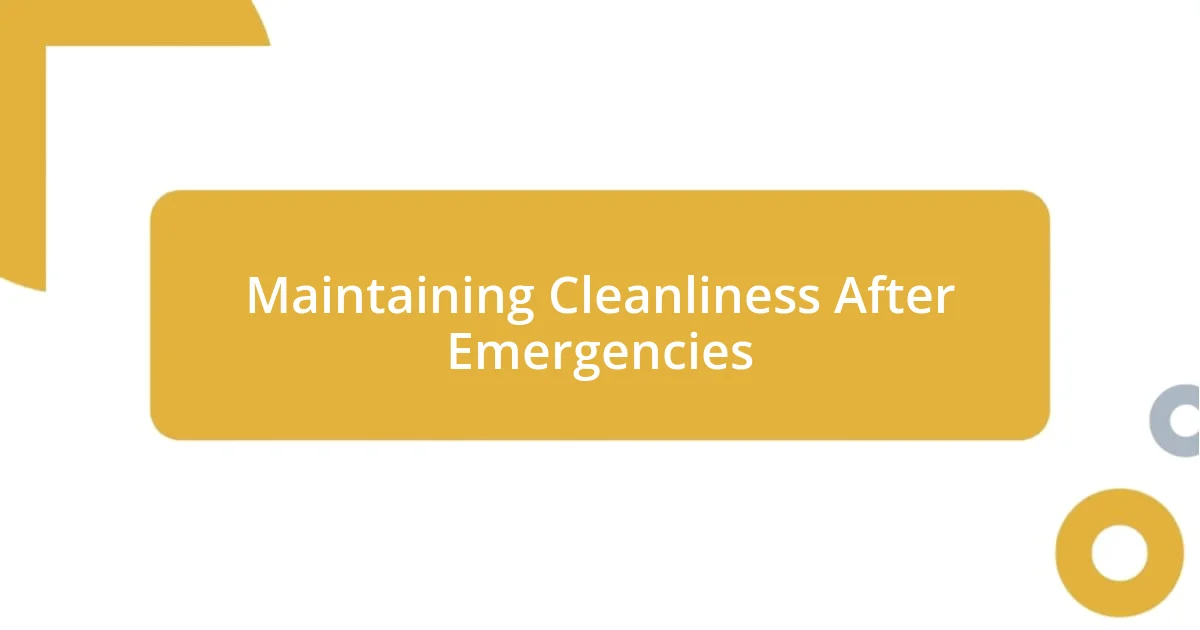
Maintaining Cleanliness After Emergencies
After an emergency, maintaining cleanliness often feels like a daunting task, but I’ve found that having a cleaning ritual can really help. For instance, when recovering from a burst pipe in my kitchen, I created a checklist of essential tasks. This not only kept me organized but also instilled a sense of progress as I checked things off. Isn’t it reassuring to see tangible results as you work through a challenging situation?
Emotional resilience plays a key role in managing the aftermath of a mess. I vividly recall dealing with a minor flood in my basement. At first, I was overwhelmed by anxiety, but I took a moment to breathe and prioritize. Focusing on one small area at a time made the process feel less intimidating. Have you ever noticed how a calm mindset can shift your entire approach to cleaning chaos?
Another essential step I’ve embraced is regular follow-up cleaning. After an unexpected event like a spill or clutter buildup, I make it a point to reassess the area a few days later. While I was tidying up after a family reunion, I discovered that leaving some things unattended often led to bigger messes down the line. It’s fascinating how a quick inspection can prevent further complications, isn’t it?
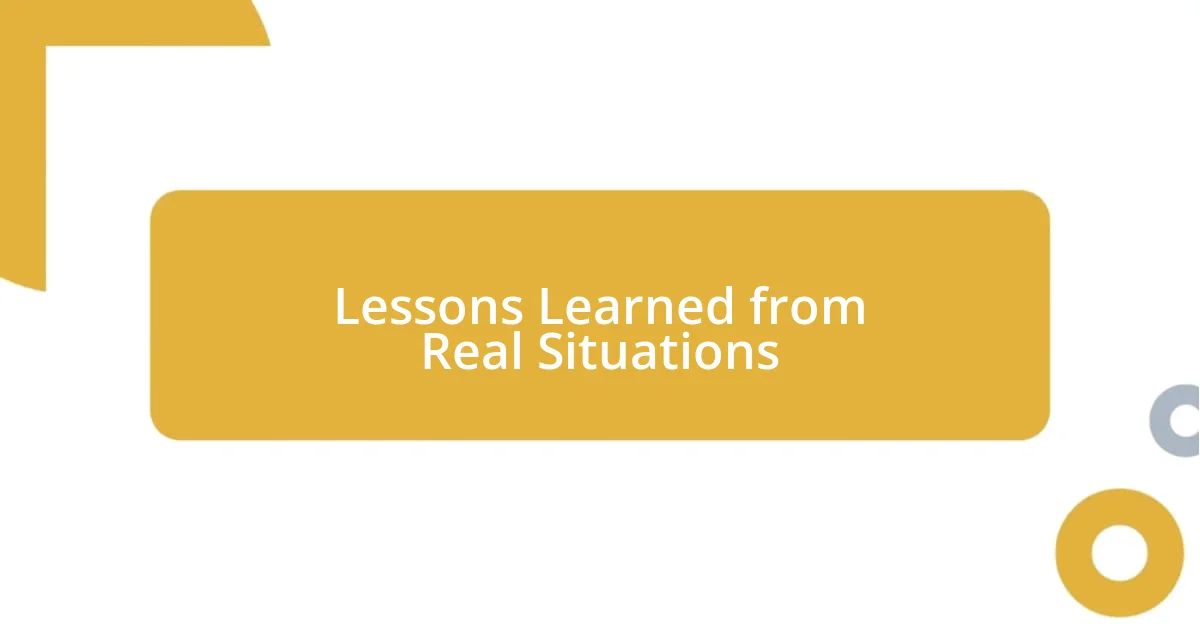
Lessons Learned from Real Situations
In my experience, one of the most significant lessons learned from real emergency cleaning situations is the importance of staying calm. There was a time during a holiday gathering when my cat knocked over a bowl of gravy all over the dining room floor. My first instinct was to panic, but instead, I took a deep breath and focused on one task at a time—wiping up the mess first, then tackling the stained tablecloth. It was a simple yet effective strategy that kept chaos at bay and allowed me to handle the situation gracefully. Have you ever noticed how panic can cloud your judgment in the moment?
Another lesson that stands out is the necessity of proper equipment. One rainy afternoon, I found myself dealing with muddy paw prints all over my entryway after a playdate with my daughter’s friends. Frantically searching for cleaning supplies, I realized I had no mop on hand; I only had a rag. What I learned from that experience is that a little preparation can make all the difference. Now, I keep an emergency cleaning kit stocked and easily accessible, reducing my stress and making cleanup much smoother. Isn’t it amazing how a few supplies can empower you in times of mess?
Lastly, I’ve come to appreciate the value of perspective. I remember a time when I spilled a full glass of red wine on my white carpet during a dinner party. Instead of viewing it as a disaster, I chose to see it as an opportunity for creativity. After the initial shock, I devised a plan to use the situation as a reason to re-decorate my living room—a refresh that had been on my mind for a while. Sometimes, it’s beneficial to shift our mindset from frustration to appreciation, don’t you agree?










